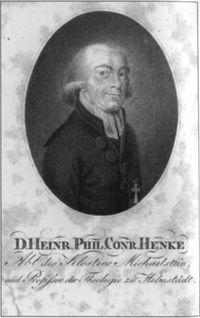
Heinrich Philipp Konrad Henke
Encyclopedia

Germany
Germany , officially the Federal Republic of Germany , is a federal parliamentary republic in Europe. The country consists of 16 states while the capital and largest city is Berlin. Germany covers an area of 357,021 km2 and has a largely temperate seasonal climate...
theologian
Theology
Theology is the systematic and rational study of religion and its influences and of the nature of religious truths, or the learned profession acquired by completing specialized training in religious studies, usually at a university or school of divinity or seminary.-Definition:Augustine of Hippo...
, best known as a writer on church history, was born at Hehlen
Hehlen
Hehlen is a municipality in the district of Holzminden, in Lower Saxony, Germany....
, Brunswick
Brunswick-Lüneburg
The Duchy of Brunswick-Lüneburg , or more properly Duchy of Brunswick and Lüneburg, was an historical ducal state from the late Middle Ages until the late Early Modern era within the North-Western domains of the Holy Roman Empire of the German Nation, in what is now northern Germany...
.
He was educated at the gymnasium of Brunswick and the University of Helmstedt
University of Helmstedt
The University of Helmstedt, official Latin name: Academia Julia , was a university in Helmstedt in the Duchy of Brunswick-Wolfenbüttel that existed from 1576 until 1810....
, and from 1778 to 1809 he was professor, first of philosophy
Philosophy
Philosophy is the study of general and fundamental problems, such as those connected with existence, knowledge, values, reason, mind, and language. Philosophy is distinguished from other ways of addressing such problems by its critical, generally systematic approach and its reliance on rational...
, then of theology
Theology
Theology is the systematic and rational study of religion and its influences and of the nature of religious truths, or the learned profession acquired by completing specialized training in religious studies, usually at a university or school of divinity or seminary.-Definition:Augustine of Hippo...
, in that university. In 1803 he was appointed principal of the Carolinum in Braunschweig
Braunschweig
Braunschweig , is a city of 247,400 people, located in the federal-state of Lower Saxony, Germany. It is located north of the Harz mountains at the farthest navigable point of the Oker river, which connects to the North Sea via the rivers Aller and Weser....
as well.
Henke belonged to the rationalistic school. His principal work (Allgemeine Geschichte der christlichen Kirche, 6 vols., 1788–1804; 2nd ed., 1795–1806) is commended by FC Baur
Ferdinand Christian Baur
Ferdinand Christian Baur was a German theologian and leader of the Tübingen school of theology...
for fullness, accuracy and artistic composition. His other works are:
- Lineamenta institutionum fidei Christianae historico-criticarum (1783)
- Opuscula academica (1802)
- Predigten
He was also editor of the Magazin für die Religionsphilosophie, Exegese und Kirchengeschichte (1793–1802) and the Archiv für die neueste Kirchengeschichte (1794–1799).
His son Ernst Ludwig Theodor Henke
Ernst Ludwig Theodor Henke
Ernst Ludwig Theodor Henke , German, historian, was the son of the theologian Heinrich Henke.After studying at the university of Jena, he became professor extraordinarius there in 1833, and professor ordinarius of Marburg in 1839....
was a published historian.

